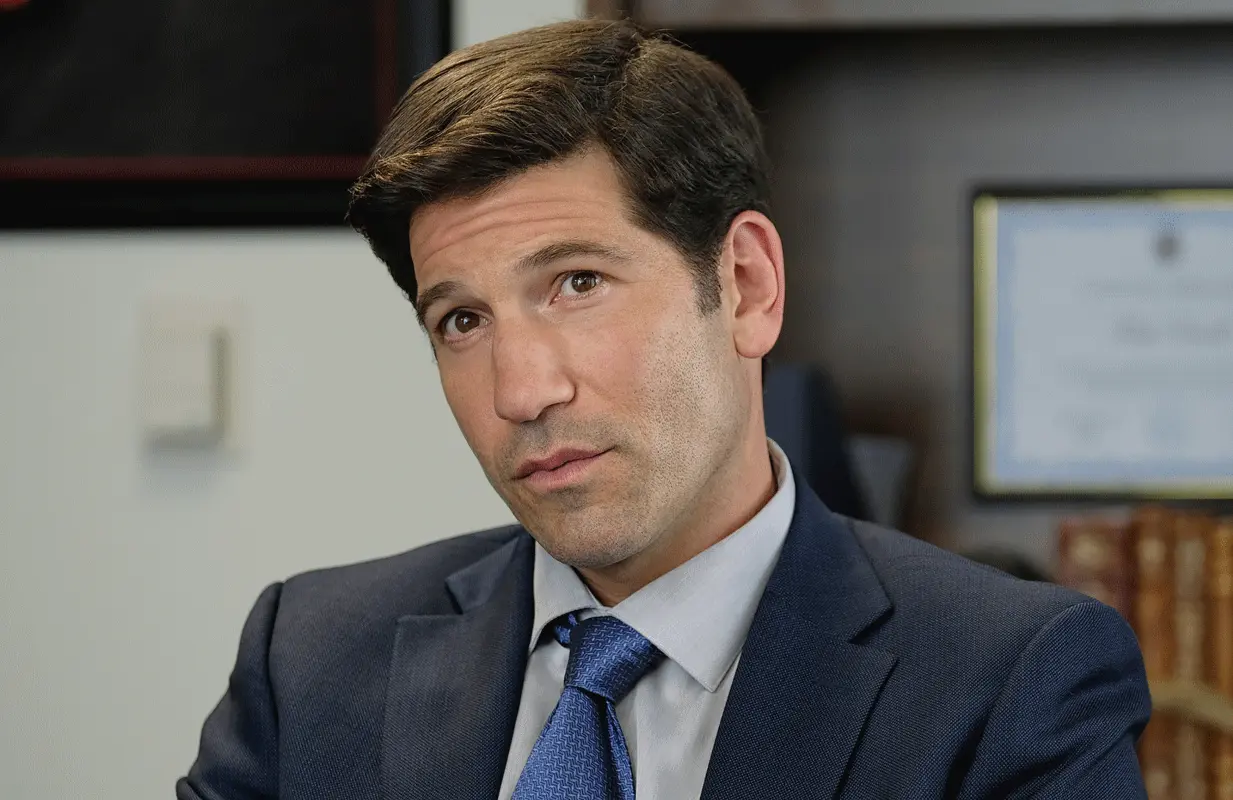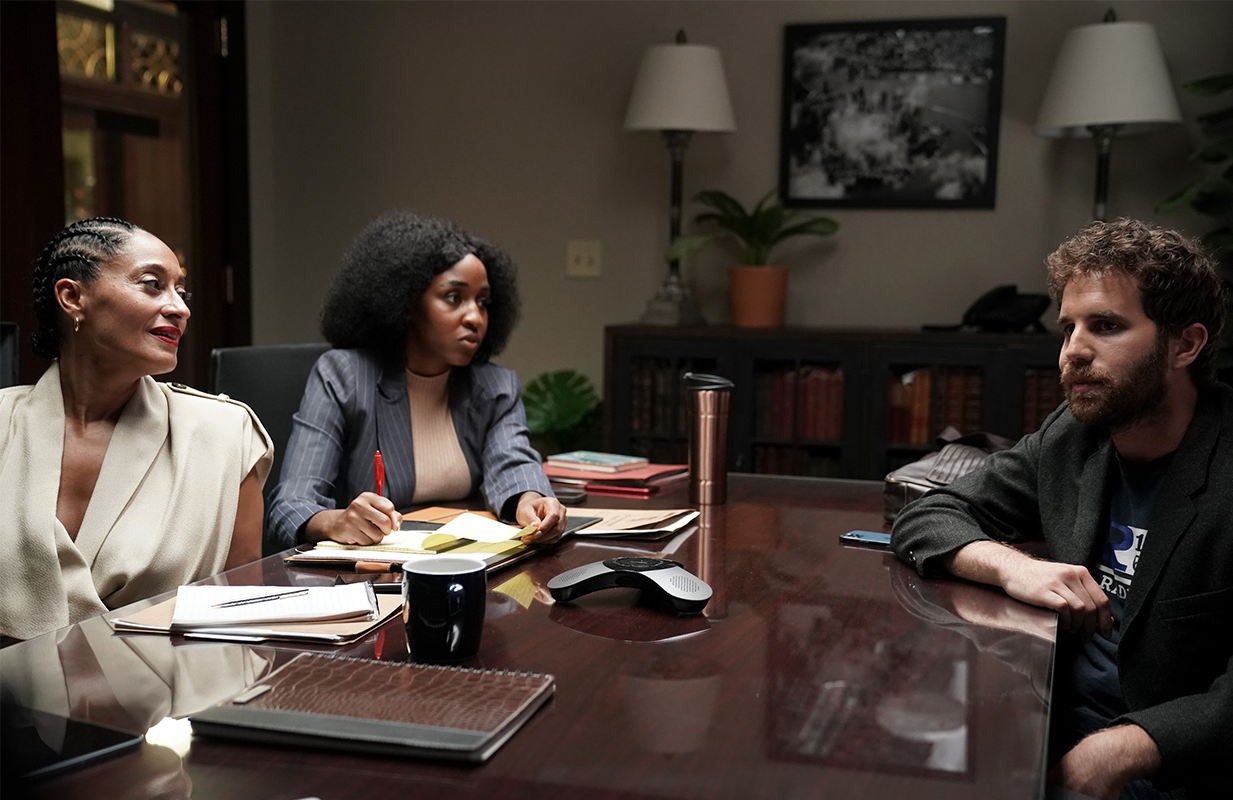B.J. Novak's The Premise Takes Big Swings, Doesn't Always Connect
-
 Jon Bernthal plays a father who lost his daughter to gun violence in one of The Premise's most intriguing episodes. (Photo: Ray Mickshaw/FX)
Jon Bernthal plays a father who lost his daughter to gun violence in one of The Premise's most intriguing episodes. (Photo: Ray Mickshaw/FX)If there’s one format that has come to define the Peak TV era, it’s the anthology series. What started decades ago with The Twilight Zone transitioned into American Horror Story (and American Horror Stories), followed by Black Mirror, Room 104, and Modern Love, each of which examines our shared human experience from a different perspective. With their one-off structure, anthologies allow producers to stretch their wings and explore big ideas, but more often than not, this creative freedom leads to unven seasons, as some episodes rise to the challenge, while others falter.
Sadly, B.J. Novak’s new comedy anthology The Premise does little to improve the genre’s reputation. Described as “an anthology of now,” the five-episode FX on Hulu series tells five distinct stories about the drawbacks of living in — cue the pots and pans — unprecedented times. The episodes vary widely in tone and content: the first stars Ben Platt as a Brooklynite who unknowingly records police abusing a Black man in the background of a sex tape, while another follows a disillusioned young woman (Lola Kirke) who becomes obsessed with her anonymous Instagram troll. Novak, best known as a star and writer on The Office, is credited as a writer or co-writer on each episode, and his presence serves as one of the only points of connection between the vignettes.
FX insists that “no topic is off limits” for The Premise, but the series seems to get bogged down by the scope of this promise. The show's five installments serve as a reflection on social justice allyship, gun violence, celebrity culture, our obsession with social media, income inequality, bullying, and the conflict between self-identity and perception, a list that reads like Twitter’s trending sidebar after a particularly long day of discourse. Each are worthy of examination, but it would be difficult enough to effectively satirize one across a full season, let alone multiple over the course of just a handful of 30-minute episodes.
From the get-go it's fairly clear that Novak may have bitten off more than he can chew, although the first episode, "Social Justice Sex Tape," does make good use of The Premise’s comedic angling. In a clear break from his nice-guy Broadway persona, Ben Platt plays Ethan, a feckless “ally” who finds evidence that could clear the name of an innocent Black man, Darren Williams (Jermaine Fowler), in the background of a sex tape he made months prior. Ethan claims to support civil rights — “I protest, I donate, I march,” he says, repeatedly — but when Darren’s lawyers (Ayo Edebiri and Tracee Ellis Ross) ask him to release the tape, he hesitates, as if avoiding personal embarrassment is of equal importance to freeing an innocent man. The episode, which is co-written by lawyer and journalist Josie Duffy Rice, doesn’t dig too deep beyond this basic premise (it would be interesting to see how this experience affects Ethan’s inflated sense of self in the weeks ahead), but what’s there effectively dramatizes the hoops white liberals are willing to jump through to avoid taking direct action on causes they purport to care about.

Of The Premise’s five episodes, only “Social Justice Sex Tape” and “The Ballad of Jesse Wheeler” hew to our traditional idea of comedy. The latter, written and directed by Novak, follows a clueless pop star (Lucas Hedges) who returns to his high school to donate a new library, but instead promises to have sex with the valedictorian. Jesse Wheeler’s impromptu announcement inspires a frenzied academic competition among the students, particularly Abbi (Kaitlyn Dever), a slacker who stopped seeing the value in school long ago. Like “Sex Tape,” “Ballad” doesn’t quite stick the landing — it stops short of offering real insight into celebrity culture and parasocial relationships — but it boasts some genuine laugh-out-loud moments along the way. Even more so, the episode is an excellent vehicle for Hedges and Dever, both of whom get a chance to play against type, as well as a large ensemble cast that includes the late Ed Asner as a history teacher tasked with picking the winner, George Wallace as the principal desperately trying to end the challenge, and Brendan Scanell as Abbi’s best friend and main competitor.
Without much humor to help mask their flaws, the other three episodes struggle to live up to the anthology’s lofty ideals. Premise-wise, the most intriguing of these more drama-skewing vignettes is “Moment of Silence,” starring Jon Bernthal as a grieving father who, after losing his daughter to gun violence, joins the PR arm of the National Gun Lobby. It’s heavily implied that Bernthal’s character is planning a mass shooting at his office, but his friendship with a coworker (Boyd Holbrook) complicates things; over the course of 30 minutes, the episode succeeds in ratcheting up this tension, before a disappointing ending pops it like a balloon, leaving us questioning whether Novak was trying to say something profound about gun violence, or nothing at all.
If “Moment of Silence” depicts a unique situation (although one that is unfortunately becoming more common in the United States), “The Commenter” offers a more universal take on the human condition: Lola Kirke plays a writer who begins to question the identity she’s created for herself when a mean commenter spams her Instagram posts. The episode, co-written by Trick Mirror author Jia Tolentino, asks big questions about how we’re perceived, how we wish to be perceived, and their intersection, but ultimately gets bogged down by its reliance on Kirke’s inner monologue to advance the story. “The Commenter” is indicative of a larger problem within The Premise, which seems to think that lengthy segments of uninterrupted dialogue are an effective substitute for character development and plot. Throughout the five episodes (particularly “Butt Plug,” the weakest of the bunch), the characters spend so much time talking that their words slowly coalesce into a bland nothingness. It’s a feeling akin to scrolling quickly through Twitter, the cacophony of takes appearing for a brief moment, but never embedding in your mind.
At the risk of sounding too reductive, The Premise’s greatest fault is that each of its five episodes rarely go beyond their initial premises. In the case of “Social Justice Sex Tape” or “The Ballad of Jesse Wheeler,” these central conflicts are interesting enough to overcome clunky writing and/or a disappointing ending, but others struggle to convey the gravity of their themes. Still, it’s hard to fault a show taking such big swings for missing a few times. Hopefully if The Premise returns for more episodes — that’s the beauty of an anthology! — it will fare better the second time around.
The Premise premieres Thursday, September 16 on FX on Hulu. New episodes are set to drop Thursdays through October 7.
Claire Spellberg Lustig is the Senior Editor at Primetimer and a scholar of The View. Follow her on Twitter at @c_spellberg.
TOPICS: The Premise, FX, FX on Hulu, Ayo Edebiri , Ben Platt, B.J. Novak, Boyd Holbrook, Brendan Scanell, Ed Asner, George Wallace, Jermaine Fowler, Jon Bernthal, Kaitlyn Dever, Lola Kirke, Lucas Hedges, Tracee Ellis Ross
- B.J. Novak's The Premise goes nowhere as a wannabe Black Mirror for the millennial set
-
TV Today: Brooklyn Nine-Nine Concludes Its
Soul-Searching Final Season - B.J. Novak's The Premise unveils its official trailer
- B.J. Novak's FX comedy anthology series sets The Premise as its title, adds Ben Platt, Tracee Ellis Ross, Daniel Dae Kim and more